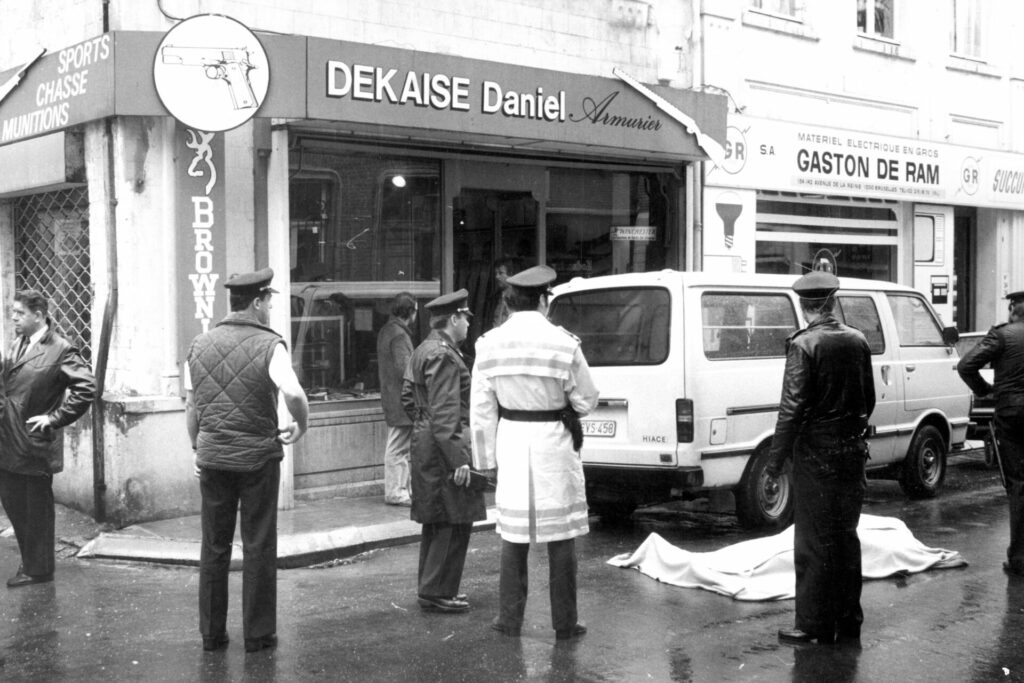Belgian gangster Alain Moussa, one of the key suspects in the Brabant Killers case, died on Friday night of a heart attack at age 71, De Standaard reports. In a post on Facebook, Moussa’s girlfriend wrote that “he departed without weapons, without violence, and without hate.”
The gangster spent the last few years of his life in a small flat in the Brussels municipality of Ganshoren, where he was a regular at a local pub. His life of crime did not leave him a rich man and he lived a modest life.
Nicknamed “Le Flingueur” (the gunslinger) Moussa was a prolific gangster throughout the 1980s. Starting his career guarding bars in Brussels’ troubled North Quarter, he later worked for notorious gangster Ramadan Dodack and pimp Michel Dewit. Moussa was part of the infamous “Baasrode gang” led by Phillippe ‘Jonny’ De Staerke, Dominique Salesse, and Leopold Van Esbroeck.
His gang got its name from a robbery it committed at a post office on 24 June 1985 in Baasrode, near Dendermonde. The gang would later take part in dozens of armed robberies across the country. Moussa would ultimately serve ten years in prison for his involvement. He later returned to prison several times, usually as a result of his heavy cocaine addiction.
Violent tactics
Due to the violent armed tactics of the Baasrode gang, they were often compared to the Brabant Killers gang. Ringleader De Staerke was officially suspected by a judge in Dendermonde for being part of the Brabant Killers gang during a robbery in Aalst, but he was eventually dropped as a potential suspect. The Nivelles gang were responsible for 28 deaths and dozens of injuries during a crime spree in the early 1980s.
The Brabant Killers are possibly the most important cold case in Belgian history. Suspected far-right extremists and career criminals are thought to have had ties to extremist political movements and criminal gangs. How many played a role in the killings is unknown, though it is suspected that up to 10 people were involved.
Following a chaotic and disorganised official investigation into the group which failed to find any culprits, theories have abounded about the identity of the perpetrators. Some have alleged the gang's ties to the police, mafia, far-right extremist groups, and other organisations.
In 2021, Moussa caused a stir for one final time. On social media, he accused his former partners in crime, De Staerke and Salesse, of being complicit in the Brabant Killers gang. “I once saw Salesse open fire on a crane operator driving a crane. He was very aggressive. I thought: if he can do that, he can also be a member of the Brabant killers gang,” Moussa tools De Standaard two years ago.
Police interviewed Moussa extensively about his potential knowledge, and involvement, in the Brabant Killers case. Police reportedly did not learn anything that had not been told to them several years prior.
Related News
- Belgian series '1985' on Brabant Killers highlights country's language divide
- Suspected Brabant killer arrested in Thailand
“With De Staerke, I once drove past the Delhaize in Eigenbrakel. He went in there. I don’t remember whether that was before or after the raid on that supermarket (27 September 1958, ed.). I used a lot of cocaine and heroin in my life. It is difficult to sort out my memories. But I am sure that De Staerke once implicitly asked me if I wanted to take part in a series of robberies. I think it was about the [Nijvel] gang robberies,” he said.
Authorities asked Moussa to apologise for his “unsubstantiated” claims about his former partners in crime, which he refused to do. “I am not going to apologise for anything. And certainly not in front of villains like that,” he said. Moussa previously boasted that he had never shed blood during a robbery, despite his gunslinger reputation.

